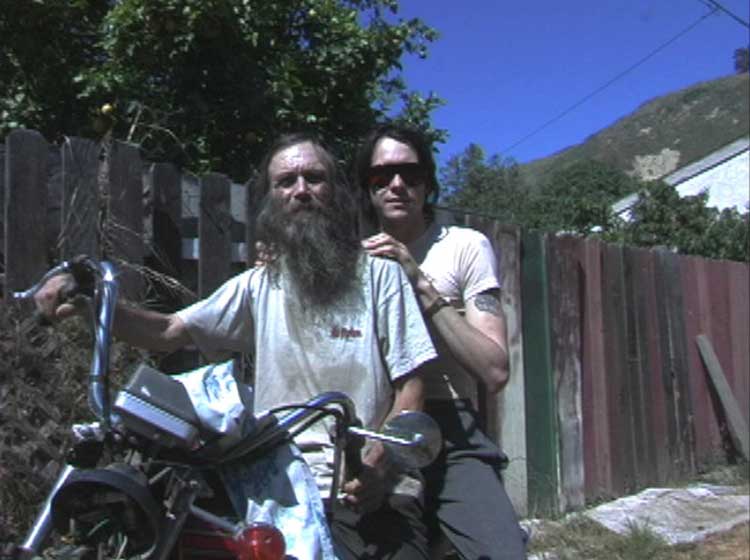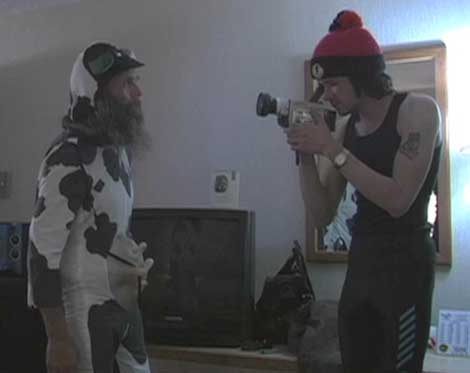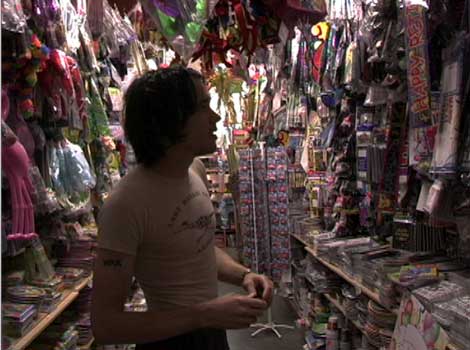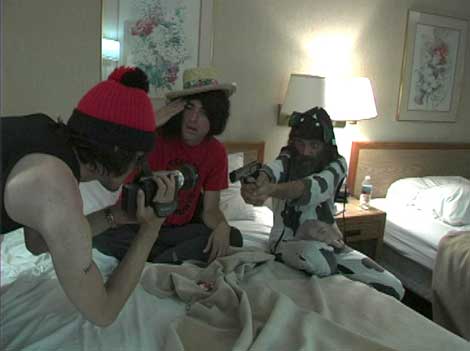Celebrity can be problematic. In fact, celebrity is one of the most poisonous influences on individual and collective human psychology at work in contemporary society, undermining the concept of individual creative autonomy as it unilaterally erases millennia-old collectively authored cultural traditions in the blink of a botoxed eye. Scientists believe that global warming is directly linked to celebrity emissions. Fuck celebrity. I wasn’t even going to participate in this “Celebrity” themed issue. But then I heard about Giuseppe.
In the late ’80s, Giuseppe Andrews was living with his Dad in a van in a grocery store shopping lot in Malibu, when his Dad—former rhythm guitarist for the Bee Gees and Andy Gibb—got a $50 gig in a hair infomercial. And it turned out they needed a kid for one scene. One thing led to another and Giuseppe was soon appearing in major Hollywood productions like Independence Day, Pleasantville and American History X, culminating in a costar role in the 1999 Eddie Furlong coming-of-age at a KISS concert saga Detroit Rock City.
This is where things start to get interesting. Detroit Rock City tanked at the box office, but director Adam Rifkin kept in touch with Giuseppe, who—increasingly dissatisfied with Hollywood and its fussy micromanagerial production methodologies—put his acting career on the back burner in order to do what he really wanted, which was to direct. But rather than entrench himself further in the Industry, Giuseppe reinvented himself as the ultimate DIY auteur. By this time, he and his dad had settled in the Ramona Trailer Park in Ventura, and Giuseppe began writing, directing, shooting, editing, scoring and acting in absurdist fictions starring the elderly fringe-dwelling denizens of his compound, on budgets that only occasionally rose beyond three figures.
Seven years and 23 rough cinematic gems later, Rifkin took a camera to Ventura to document the making of #24—Garbanzo Gas,
Giuseppe’s attempt to set a record by shooting a feature in two days for $1000. Giuseppe Makes a Movie—which has its U.S. debut at the Los Angeles Film Festival on June 14th—successfully boils down the outsider weirdness and outrageous scatological and sexual humor of Giuseppe’s oeuvre into an accurate, if necessarily superficial, précis.
Unexpectedly, it also unfolds as a moving meditation on creativity, community and the true purpose of art. And Giuseppe emerges as the improbable bastard grandchild of the most radical cinematic positions of the ’60s. “All that means anything in any kind of art form,” he proclaims early in the doc “is a vibe—if the vibe is important, if you’re digging the vibe of the whole thing—by which I mean the idea… then that’s all that matters. All that other little shit, it’s absolutely worthless.”
Although he comes across as something of a gutter savant, Giuseppe’s influences are film-school impeccable. Garbanzo Gas, for example, was inspired by a graphic slaughterhouse scene in Rainer Fassbinder’s In a Year of 13 Moons—Giuseppe thought to himself, “If I just picked a random cow and I sent her on an adventure, what would that be? So I started writing this story about a cow that the slaughterhouse sends on an all-expense-paid vacation to a motel.”
In another scene, his dad comes across an old photo of a teenage G sitting in the storage shed that was his private space before they got that second trailer, and Giuseppe delightedly reads off titles from the wall of videos in the background “My Life to Live, Godard—I remember them all—Love Meetings, Pasolini, where he interviews people on a beach; Mamma Roma, Pasolini; Oedipus Rex, Pasolini. We got Stroszek, we got Night of the Iguana, Viridiana—I related big to that because of the homeless people… it’s about a nun who takes in homeless people into a house and when they leave town the bums go crazy and wreck everything, spill wine, get drunk—I wanted to make a whole film like that.”
To a great extent, Giuseppe’s filmography (currently at 50 and counting) has adhered to this vision, with surreal potty-mouth vagrants drinking, snorting, fighting, killing and having sex with ghosts, stuffed animals, and orthopedic shoes. It’s no fluke that his handful of commercial releases have been through über-sleazemongers Troma. But it is an undeniably authentic vision, and of the outré auteurs his work brings to mind—Harmony Korine, the Kuchar brothers, William Eggleston, Andy Warhol and John Waters—it is the last two that have the most resonance.
Like Warhol with his superstars and Waters’ Baltimore degenerate revue, Giuseppe Andrews wrests control of the star-making machinery to turn celebrity on its head, beatifying bottom-rung clingers like the amiable Manson-lookalike Vietnam Ron (who plays the cow) or recently fired titty-bar waitress Tiffany Naylor, who tears up in her Egyptian knick-knack filled apartment when she explains “I know a lot of people that wouldn’t watch these films, but they actually mean a lot to me—maybe not the story lines so much, but working together. Just getting the whole experience… It’s not really a job for me.” Or anarchist octogenarian Tyree, who routinely deadpans lines like “Fart an umbilical cord out of your phony asshole, and I’ll hang a pig with it while I impregnate you with my 80-year-old pork-rind dick.” Spoken like a true star.
Giuseppe Andrews’ films, music, visual art and writings are available at www.giuseppeandrews.net
Giuseppe Makes A movie
Directed by Adam Rifkin
giuseppemakesamovie.com
U.S. Premiere: LA Film Festival
Saturday, June 14 at 10 p.m.
Regal Cinemas 10;
for more info: www.lafilmfest.com





